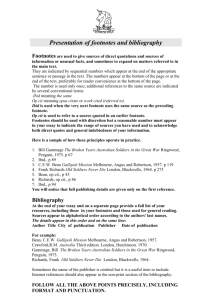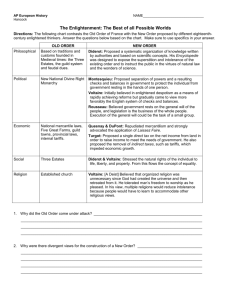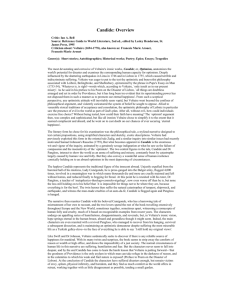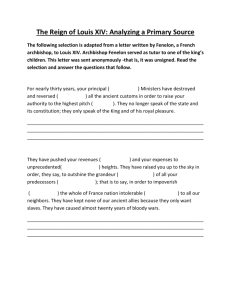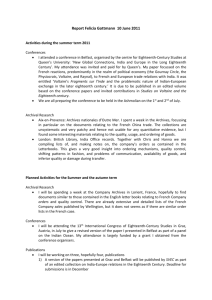Music in French Fiction - Whitwell - Essays on the Origins of Western
advertisement
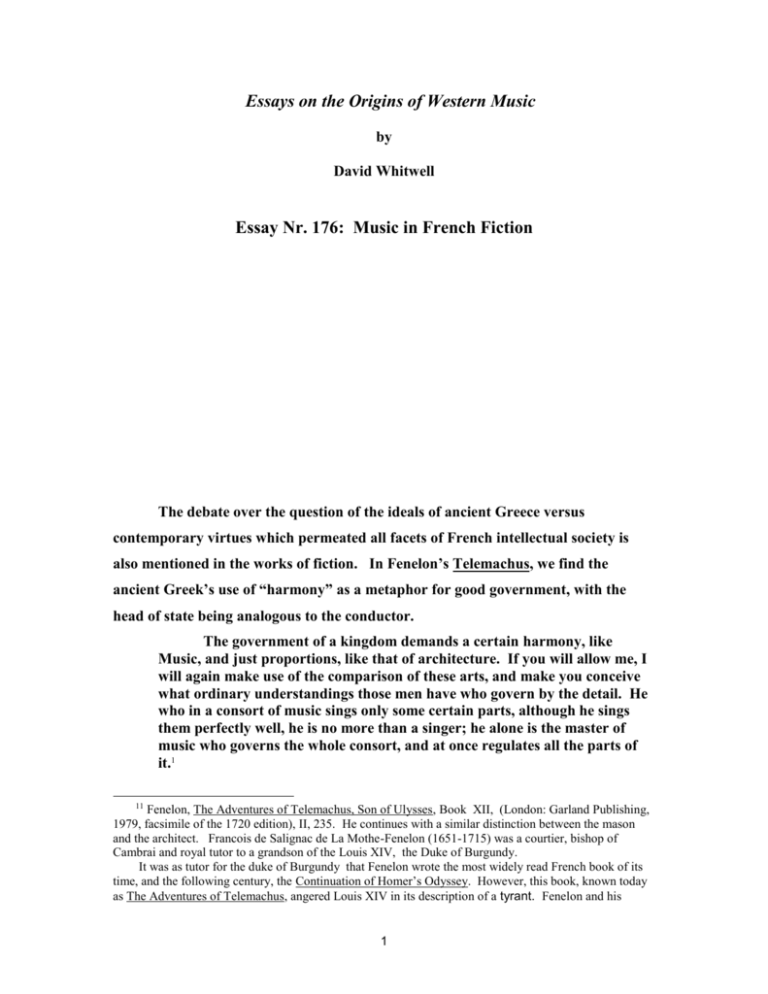
Essays on the Origins of Western Music by David Whitwell Essay Nr. 176: Music in French Fiction The debate over the question of the ideals of ancient Greece versus contemporary virtues which permeated all facets of French intellectual society is also mentioned in the works of fiction. In Fenelon’s Telemachus, we find the ancient Greek’s use of “harmony” as a metaphor for good government, with the head of state being analogous to the conductor. The government of a kingdom demands a certain harmony, like Music, and just proportions, like that of architecture. If you will allow me, I will again make use of the comparison of these arts, and make you conceive what ordinary understandings those men have who govern by the detail. He who in a consort of music sings only some certain parts, although he sings them perfectly well, he is no more than a singer; he alone is the master of music who governs the whole consort, and at once regulates all the parts of it.1 11 Fenelon, The Adventures of Telemachus, Son of Ulysses, Book XII, (London: Garland Publishing, 1979, facsimile of the 1720 edition), II, 235. He continues with a similar distinction between the mason and the architect. Francois de Salignac de La Mothe-Fenelon (1651-1715) was a courtier, bishop of Cambrai and royal tutor to a grandson of the Louis XIV, the Duke of Burgundy. It was as tutor for the duke of Burgundy that Fenelon wrote the most widely read French book of its time, and the following century, the Continuation of Homer’s Odyssey. However, this book, known today as The Adventures of Telemachus, angered Louis XIV in its description of a tyrant. Fenelon and his 1 In this same book, Fenelon makes the important point that one learns about music from performance, not from books. Who is it that taught you to know good and bad poets? It was frequent reading and reflection with such persons as had a true taste that way. Who is it that procured you that judgment in music? It was the same application of mind in observing musicians.2 Cyrano de Bergerac’s Other Worlds [L’Autre Monde] of 1650 is a reflection of society’s interest in the possibility of life on the other planets at a time when, even though astronomy had fostered this interest, telescopes were not yet sufficient to reject the possibility that even the Moon might be inhabited. It is indeed to the Moon that the central figure of this novel first travels and a citizen of that body explains both the nature of hearing and provides a curious explanation for how music communicates emotions to the listener. The operation of hearing is not more difficult to conceive and for the sake of brevity let us simply consider the case of the notes of a lute touched by the hands of a virtuoso. You will ask me how I can possibly perceive something so far away from me and which I cannot see at all. Does a sponge come out of my ears and soak up this music in order to bring it to me? Or does the musician beget another little musician inside my head with a little lute and instructions to sing the same tunes to me like an echo? No; the miracle is due to the fact that the plucked string strikes the air which is composed of little bodies and drives it into my brain, gently piercing it with these little bodily nothings. If the string is taut the note is high, because it drives the atoms more vigorously and once the organ is thus penetrated it furnishes my imagination with sufficient of them from which to make its picture. If it is not so taut, it happens that when our memory has not yet completed its image, we are obliged to repeat the same sound to it; so that, for example, from the materials furnished by the measures of a saraband, it takes enough to complete the portrait of this saraband. But this operation is by no means as wonderful as those by which we are moved now to joy, now to anger with the aid of the same organ. This occurs when in the course of their movement the little bodies meet others inside us which are moving in the same manner, or whose own shape makes them susceptible to the same type of vibration. The new arrivals excite their hosts to imitate their motion and in this way when a violent tune encounters the fire of our blood, it makes it take up the same dance and excites it to friends were banished from the court, the printer was arrested and the police attempted to confiscate all copies. 2 Ibid., Book XXIV, Op. cit., II, 270. 2 thrust itself outwards, and that is what we call “the ardor of courage.” If the sound is sweeter and has only the strength to raise a lesser, more quavering flame, by causing this to travel along the nerves and membranes and through the apertures in our flesh, it excites that tickling sensation which we call “joy.” The other passions are aroused in the same way, according to the greater or lesser violence with which these little bodies are hurled at us, according to the motion resulting from their contact with other impulses and according to the mobility they find in us.3 The characteristic, with regard to the perception of music, which most interested both the ancient philosophers and those of the Middle Ages, was that music is the only art which you cannot see. It is from this perspective that we find in Fenelon’s Telemachus King Inachus’s description of Music as an “odor,” as if you can smell music, if you cannot see it. He holds in his hand a golden harp, and with eternal raptures sings the wonderful works of the gods: from his heart and his mouth an exquisite odor takes its being; the melody of his lyre and the voice were enough to ravish the gods as well as men....4 Only in Fenelon’s Telemachus, among the fictional works, do we find insights into the purpose of music, and here they are all related to the communication of emotions. This said, Termosiris gave me a flute, of such sweetness, that the echoes of the hills, which carried the sound of every side, soon drew each neighboring shepherd round about me. My voice was endued with a Divine harmony: I found myself transported and moved, as by a superior power, to sing the graces which Nature has conferred upon the country. We passed the days and part of the nights in singing together.5 ..... The hollow valleys shall ring again with the consorts of shepherds, who along the crystal brooks shall sing to their pipes both of their amorous pains and pleasures....6 In one place Fenelon casts this more in the example of the “ethos” of the ancient Greeks, the ability of music to change the character of the listener. 3 Cyrano de Bergerac, Other Worlds, trans., Geoffrey Strachan (London: Oxford University Press, 1965), 84ff. 4 Fenelon, The Adventures of Telemachus, Son of Ulysses, Book XIX, Op. cit., II, 158ff. 5 Ibid., Book II, Op. cit., I, 36. 6 Ibid., Book XII, Op. cit., I, 286. 3 Apollo [came to] teach the shepherds what are the charms of harmony; soften their savage hearts, show them the amiableness of virtue, and make them feel how sweet it is to enjoy, in this retirement, the innocent delights that nothing can deprive a shepherd of.7 Fenelon’s Telemachus is also rich in descriptions of art music set in pastoral scenes, reminiscent of the ancient lyric poets. Every day was a festival; nothing was heard but the warbling of the birds, or the soft whispering of the zephyrs, sporting amidst the trembling boughs, or the murmur of a transparent stream descending from some rock, or songs which the Muses inspired into the shepherds who followed Apollo.8 And, There was at Tyre a young Lydian called Malachon, of marvelous beauty, but voluptuous, effeminate, and swallowed up in pleasure; his own study was how to preserve the delicacy of his complexion, to comb his flaxen locks, which waved upon his shoulders, to perfume himself, to adjust his robe in the nicest manner, to sing amorous songs to the music of his lute.9 He paints a rather romantic picture of Egypt, with meadows full of grazing cattle, workers bending under the weight of fruit they are harvesting, and, Shepherds that made the Echoes on every side repeat the melodious sound of their warbling flutes and pipes.10 In another place, he credits the Egyptians with the invention of “instruments of music to ravish the soul.”11 We might also mention that in this same book, Fenelon writes a line which reminds us of the minstrel schools of the late Middle Ages. And now the shepherd comes home again with his flute, and sings to the assembled family such new songs as he learnt in the adjacent hamlets.12 Other references to art music are found in Marivaux’s La vie de Marianne, where there is a brief mention of a specially composed song honoring newlyweds, “a 7 Ibid., Book I, Op. cit., I, 36. Ibid., Book II, Op. cit., I, 35. 9 Ibid., Book III, Op. cit., I, 65 10 Ibid., Book II, Op. cit., I, 22. 11 Ibid., Book VIII, Op. cit., I,184. 12 Ibid., Book XII, Op. cit., I, 284. 8 4 very fine epithalamium sung to soft music”13 and in Cyrano de Bergerac’s Other Worlds, where a visitor from the Earth visits the Sun and finds there, among other implausible curiosities, people who have turned themselves into birds. These birds and the visitor engage in a musical dialogue, the description of which suggests that the author himself had heard art songs which were emotionally quite sensitive. We serenaded one another by turns with the musical stories of our mutual loves. In my airs I sang that I was not only comforted but that I even rejoiced at my disaster since it had won me the honor of being lamented in such beautiful songs.... I replied in my turn with all the raptures, all the tenderness, and all the subtleties of a passion so moving that two or three times I saw it on the branch ready to die of love. In truth, I mixed so much skill with the sweetness of my voice and surprised its ear with touches so cunning and ways so little frequented by its own species, that I had its fair soul at the mercy of all the passions to which I wished to subject it.14 Curiously, opera is not as frequently mentioned in fiction as it is in all other forms of literature. It is no doubt an accurate reflection of the times that in Crebillon, fils’ Letters from the Marchioness de M***, opera is described as a place to meet one’s lover. If it must be so, my Lord, I permit you to be at the opera, and am infinitely obliged to you for your industry, to be informed what box I shall appear in; and since you so much desire it, I shall take care to have you accommodated with a place: But, as tender as the music may be, all opera nights are not alike; and whatever soft things you may tell me, with relation to Armida and Rinaldo, I shall remember too well that I have been the one, ever to allow you to be the other.15 Alain Rene Lesage, in his Le Diable Boiteux, presents two descriptions, remarkable in their detail, of serenades. While the novel is set in Madrid, we may assume his familiarity with serenades was gained in Paris. The first passages gives us much information about the musicians, and their literature of the latest songs sung in a “sweet” style. First we are told of the arrangements. 13 Marivaux, The Virtuous Orphan, trans., Mary Collyer (Carbondale: Southern Illinois University Press, 1965), 506. Pierre de Marivaux (1688-1763), born Pierre Carlet) was a minor playwright and novelist. An epithalamium is a wedding song. 14 Cyrano de Bergerac, Op. cit., 161. 15 Claude Prosper Jolyot de Crebillon, fils, Letters from the Marchiness de M*** to the Count de R***, ed., Josephine Grieder (New York: Garland, 1972), 259. 5 You may assure your cousin that I will in all things follow her advice; and that tomorrow, without fail, in the middle of the night, the street shall resound with one of the most gallant concerts that was ever heard in Madrid. And away went the intendant to secure the assistance of a celebrated musician, to whom he communicated his project, and whom he charged with the care of its execution.16 The lady herself is alerted that Don Como, governor of the pages, will “gratify you with the sound of music and sweet voices, in an evening serenade.” The night came, and with it appeared, before the balcony of the lady, two carriages, from which descended the gallant Como and his confidant, accompanied by six musicians, vocal and instrumental, who commended a very decent concert, which lasted for a considerable time. They performed many of the newest songs, and sang all the songs in vogue whose verses told the power of love in uniting hearts despite the obstacles of fortune, and the inequality of rank; while at every couplet, which the general’s daughter perceived to be directed to herself, her merriment knew no bounds. When the serenade was over, and the performers had departed in the carriages which brought them, the crowd which the music had attracted dispersed, and our lover remained in the street with Domingo alone. Later we are told that this concert, “including the carriages and the enormous quantity of wine which its bibulous performers had consumed, cost Don Como upwards of a hundred ducats....” The second serenade which Lesage describes is unique for its high drama. Here Asmodeus, Zambullo and Don Cleophas are out walking when they hear instruments tuning at the end of the street, preparing for a serenade. I am a great admirer of this sort of concert, replied Zambullo; let us by all means get near them; there may chance to be some decent voices among the lot.... The serenade was commenced by the instruments alone, which played some new Italian songs; and then two of the voices sang alternately the following couplets: List, while the thousand charms I sing, Which round thee such enchantment fling, that even Love has plumed his wing To seek thy bower. 16 Alain Rene Lesage, Asmodeus, or The Devil on Two Sticks (1707) (The Bibliophilist Society, 1932), 99ff. Lesage (1668-1747) was educated by the Jesuits at Vannes and traveled to Paris to study law. After serving as a tax collector, he became disgusted and turned to writing. 6 Thy neck, that shames the mountain snow, Thy lip, that mocks the peach’s glow, Bit Cupid’s self a captive bow Beneath thy power.... The couplets are gallant and delicate, cried the Student. They seem so to you, replied the Devil, because you are a Spaniard: if they were translated into French, for instance, they would not be greatly admired. The readers of that nation would think the expressions too figurative; and would discover an extravagance of imagination in the conceptions, which would be to them absolutely laughable. Every nation has its own standard of taste and genius, and will admit no other: but enough of these couplets, continued he, you will hear music of another kind. Follow with your eyes those four men who have suddenly appeared in the street. See! they pounce upon the serenaders: the latter raise their instruments to defend their heads, but their frail [instruments] yield to the blows which fall on them, and are shattered into a thousand pieces. Two cavaliers come to the rescue, one of whom paid for the serenade and is killed by the attackers.17 In the end, it is the evidence of the contemplative listener which confirms the presence of art music. In Fenelon’s Telemachus we find, He played on his flute, and all the other shepherds resorted to the shady elms and limpid streams, to listen to his songs.18 In another place he makes this point much more vivid. Mentor took up a harp, and played on it in so masterly a manner, that Architoas let his drop from him in very spite: his eyes struck fire; his troubled face turned pale; everybody took notice of his disorder and confusion: but at the same moment Mentor’s harp entirely transported the souls of all the bystanders; none of them hardly durst breathe, for fear of breaking in upon the profound silence, and so losing something of the divine music, still fearing least it would be too soon over. Mentor’s voice was by no means effeminate, but tuneable, strong, and expressive of every passion he turned it to.19 The subjects of his songs included the praises of Jupiter, the wisdom of Minerva, the misfortunes of young Narcissus and of the death of Adonis. All that heard him broke into resistless tears, and felt a secret pleasure in weeping. When he gave over singing, the Phoenicians looked at 17 Ibid., 161ff. Fenelon, The Adventures of Telemachus, Son of Ulysses, Book II, Op. cit., I, 34. 19 Ibid., Book VIII, Op. cit., I, 179ff. 18 7 one another with amazement: one said, this is Orpheus, for thus with his harp he used to soften the wild beasts.... One who wished to congratulate the singer was so overcome with emotion he could not speak, Arichitoas...did now begin to bestow on Mentor some commendations, but he blushed at the same time and could not proceed. Montesquieu, in his Persian Letters, which describe an imaginary visit to Paris by a Turk, and his subsequent comments on the manners of society he found there, makes fun of the serious attention given to the ancient philosophers. In this work we find music for dancing where Montesquieu describes a pastoral festival in the kingdom of the Troglodytes, They instituted festivals in honor of the gods. Maidens, adorned with flowers, and young men celebrated them with dancing and rustic minstrelsy; then followed banquets... It was at these gatherings that artless nature spoke....20 And Brantome mentions a tradition in villages of the use of the tabor and flute to accompany the young girl to the church on her wedding day.21 There is also a brief reference to military music in Fenelon’s Telemachus, which speaks of “trumpets that filled the air with martial clangors.”22 Regarding instances of entertainment music, there are two references to banquet music in Fenelon’s Telemachus, Adoam caused a magnificent repast to be brought in...the rowers seats were all filled with musicians playing upon the flute: Architoas now and then made them pause, to introduce the sweet harmony of his voice and lyre, fit to be heard at the table of the gods, and to ravish the ears of Apollo himself.23 ..... 20 Montesquieu, The Persian Letters (London: Athenaeum, 1901), 27. The Troglodytes are mentioned in both Aristotle and Herodotus as bestial tribes living in Africa. Later, in Ibid., 262, he describes a gentleman in Paris who is so enchanted by ancient Rome that he not only collects artifacts, but travels on the old Roman roads, even though it requires him to travel miles out of his way. Charles-Louis de Secondat, Baron de Montesquieu (1689-1755), was born to a family of sufficient wealth that he was able to spend much of his time in study. Although his L’Esprit des lois (1748) is better known today, the Persian Letters became very popular and inspired Voltaire’s Lettres sur les Anglais, 27. 21 Brantome, Lives of Fair and Gallant Ladies, trans., A. R. Allinson (New York: Liveright, 1933), 367. 22 Fenelon, The Adventures of Telemachus, Son of Ulysses, Book X, Op. cit., I, 230. 23 Ibid., Book VIII, Op. cit., I, 177ff. 8 At other times Ulysses appeared to him of a sudden in those feasts where joy shines forth amidst delights, and where you might hear the soft harmony of a voice, with a harp more melodious than the harp of Apollo, or the voice of all the Muses.24 Finally, Alain Rene Lesage, in his Le Diable boiteux, briefly refers to a trio sung in a tavern by “a lusty Flemish captain, a chorister of the French opera, and an officer of the German guard.” They have been drinking since eight in the morning and, for honor of country, each is determined to be the last standing.25 Music in Fiction by Voltaire All of Voltaire’s fictional romances are to some degree disguised philosophy, and the most interesting of these today are those which seem to comment on contemporary events. For example, his most famous romance, Candide, was written as a direct response to the earthquake in Lisbon, in November, 1755, in which 30,000 were killed. The quake hit on All Saints’ Day, a very significant church festival day in Europe, and thus it was the fact that so many of the faithful were among the dead that so shook Voltaire’s faith. The response by some, such as Rousseau (who said man himself was to blame for being in church) and the followers of Leibniz’s philosophy of optimism, astonished Voltaire. In Candide, Candide and Professor Pangloss (representing Leibniz) journey to Lisbon in time for the earthquake. Pangloss explains, of the tragedy, All this was indispensable for private misfortune makes the general good, so that the more private misfortunes there are, the greater is the general good. Curiously, as he sometimes did, Voltaire pretended this was not his work. What is this brochure entitled Candide which people say is being scandalously circulated and is said to come from Lyons?.... It is claimed that there are people impertinent enough to impute this work, which I have never seen, to me!26 24 Ibid., Book XVIII, Op. cit., II, 123. Alain Rene Lesage, Op. cit.,25. 26 Letter to Gabriel Cramer (February, 1759), in The Selected Letters of Voltaire, trans., Richard Brooks (New York: New York University Press, 1973), 198. 25 9 Perhaps such statements were made in self-defense, to protect himself against the repetition of earlier unpleasant experiences with the critics. This seems all the more evident in the fact that Candide also includes several satirical views of the critics. Later one of these critics speaks of the “official rules” of writing drama. Whoever neglects any one of these rules, though he may write two or three tragedies with tolerable success, will never be reckoned in the number of good authors.27 In his fictional romances, Voltaire offers humorous references to several aspects of contemporary discussion on music and society. “Andre Des Touches in Siam,” begins with a concise reflection of Voltaire’s opinion of contemporary French music and includes a reference to his favorite composer. Andre Des Touches was a very agreeable musician in the brilliant reign of Louis XIV, before the science of music was perfected by Rameau, and before it was corrupted by those who prefer the art of surmounting difficulties to nature and the real graces of composition.28 This same romance includes a passage which reflects the ongoing discussion in France on the relative virtues of ancient and contemporary art. In the course of this story, Des Touches interviews an official from Siam named Croutef. Des Touches wants to discuss the music of Siam, which sounds discordant to him, but Croutef only wants to speak of the “harmony” of society, in the Platonic sense. Des Touches. Tell me, I beseech you, sir, if in Siam you divide the tone major into two commas, or into two semi-commas, and if the progress of the fundamental sounds are made by one, three, and nine? Croutef. By Sammonocodom, you are laughing at me. You observe no bounds. You have interrogated me on the form of our government, and you speak to me of music! Des Touches. Music is everything. It was at the foundation of all the politics of the Greeks. But I beg your pardon; you have not a good ear, and we will return to our subject. You said that in order to produce a perfect harmony -Croutef. I was telling you that formerly the tonsured Tartar pretended to dispose of all the kingdoms of Asia, which occasioned something very different from perfect harmony.... However, all things go on; people divert themselves, they dance, they play, they dine, they sup, they make love; this makes every man shudder who entertains good intentions. 27 28 Candide, in The Works of Voltaire (New York: St. Hubert Guild, 1901), I, 160. “Andre Des Touches in Siam,” in The Works of Voltaire, Op. cit., IV, 5. 10 Des Touches. And what would you have more? You only lack good music. If you had good music you might call your nation the happiest in the world.29 Another reference to the ancient-modern debates is found in “A Dialogue between Marcus Aurelius and a Recollet Friar.” In the passage in question, the friar is bringing the famous emperor and philosopher up to date on changes in Rome since his death hundreds of years before. Among these, the friar observes, Peace and the fine arts flourish here eternally. The ancient masters of the world are now become music-masters. Instead of sending colonies into England, we now send them eunuchs and fiddlers.30 Another reference to castrati is found in Candide. I was born in Naples, he said, where they make eunuchs of thousands of children every year; some die of the operation; some acquire voices far beyond the most tuneful of your ladies; and others are sent to govern states and empires [in the East]. I underwent this operation very successfully, and was one of the singers in the princess of Palestrina’s chapel.31 In the romance, Jeannot and Colin, music is included in a humorous discussion of the limited value of education for a person of high birth. There is a complaint that “the genius of young persons is smothered under a heap of useless knowledge....” A man of quality, like the young marquis, should not rack his brains with useless sciences.... Did anybody ever so much as think of talking of geometry in good company?32 It is decided that it would be a virtue if the young marquis would learn to dance, especially as he seemed to have a natural talent for music. Nature, which does all, had given him a talent that quickly displayed itself surprisingly; it was that of singing ballads agreeably. The graces of youth, joined to this superior gift, caused him to be looked upon as a young man of the brightest hopes. He was admired by the women; and having his head full of songs he composed some for his mistress. He stole from the song, “Bacchus and Love,” in one ballad; from that of “Night and Day” in another; from that of “Charms and Alarms,” in a third. But as there were 29 Ibid., 11ff. “A Dialogue between Marcus Aurelius and a Recollet Friar,” in Ibid., IV, 68. 31 Candide, in Ibid., I, 101. 32 “Jeannot and Colin,” in Ibid., III,10ff. 30 11 always in his verses some superfluous feet, or not enough, he had them corrected for twenty Louis d’or a song....33 Finally, in “The Blind as Judges of Color,” Voltaire presents a brief story of the blind in a hospital who pretend to be authorities on color. We take this as a satire on self-proclaimed experts on topics of which they know nothing, as well, perhaps, a reflection of the Scholastic views of the University of Paris, which held that one can only “know” music in its conceptual form (“speculative music”) rather than by the ear. This story concludes with the observation by a deaf man that the “deaf were the only proper judges of music.”34 Is this outrageous? Did the universities really believe this? One recalls that Petrarch, in his “Remedies for Fortune Fair and Foul” (II, xcvii), wrote this curious contention: A deaf person can know the tones and numbers characterizing the intervals of fifth and octave, as well as the other proportions of the musical scale with which musicians work. Although one does not hear the sounds of the human voice, of strings or the organ, he nevertheless may understand in his mind their fundamental canon and, doubtless, will prefer the intellectual pleasure to a mere titillation of the ear. We find art music in “The Princess of Babylon,” where Voltaire employs a pastoral scene, so often used in Renaissance and Baroque literature, as the setting for the singing of love songs. Here there is an ensemble of birds singing the soprano and alto parts, with shepherds singing the tenor and bass. One listener, with tears flowing from her eyes, calls the resulting music “consolatory and voluptuous.”35 Voltaire included two satiric views of opera in his romances. He was no lover of Italian opera, as is clear in this passage from Candide. While dinner was being prepared Pococurante ordered a concert. Candide praised the music to the skies. “This noise,” said the noble Venetian, “may amuse one for a little time, but if it were to last more than a half-hour, it would grow tiresome to everybody, though perhaps no one would care to admit it. Music has become the art of executing what is difficult; now, whatever is difficult cannot be long pleasing. 33 Ibid., 12. “The Blind as Judges of Color,” in Ibid., IV, 13ff. 35 “The Princess of Babylon,” in Ibid., III, 206. 34 12 I believe I might take more pleasure in an opera, if they had not made such a monster of that species of dramatic entertainment as perfectly shocks me; and I am amazed how people can bear to see wretched tragedies set to music; where the scenes are contrived for no other purpose than to lug in, as it were by the ears, three or four ridiculous songs, to give a favorite actress an opportunity of exhibiting her vocal-pipes. Let who will die away in raptures at the trills of a eunuch quavering the majestic part of Caesar or Cato, and strutting in a foolish manner upon the stage, but for my part I have long ago renounced these paltry entertainments, which constitute the glory of modern Italy, and are so dearly purchased by crowned heads.”36 In “The Princess of Babylon,” Voltaire satirizes the Church’s objections to opera, various excesses of opera itself and the apparent tradition of nobles dating the ladies of the opera after the show, all set in the period of ancient Babylon. After dinner he was conducted to a place of public entertainment which was enchanting, but condemned, however, by the Druids, because it deprived them of their auditors, which, therefore, excited their jealousy. The representation here consisted of agreeable verses, delightful songs, dances which expressed the movements of the soul, and perspectives that charmed the eye in deceiving it. This kind of pastime, which included so many kinds, was known only under a foreign name. It was called “an Opera,” which formerly signified in the language of the Seven Mountains, work, care, occupation, industry, enterprise, business. This exhibition enchanted him. A female singer, in particular, charmed him by her melodious voice and the graces that accompanied her. This child of genius, after the performance, was introduced to him by his new friends. He presented her with a handful of diamonds, for which she was so grateful that she could not leave him all the rest of the day. He supped with her and her companions, and during the delightful repast he forgot his sobriety and became heated and oblivious with wine.... What an instance of human frailty!37 In “The Princess of Babylon,” Voltaire presents several views of functional court music, including a master of ceremonies preceded by 20 trumpets and “a great number” of musicians seated near the buffet table.38 That this is purely functional dinner music is made clear by the following: The music, which continued during the repast, furnished every prince with an opportunity of conversing with his female neighbor. 36 Candide, in Ibid., I, 178ff. “The Princess of Babylon,” in Ibid., III, 247ff. 38 Ibid., 169, 182ff. 37 13 Voltaire makes several references to Church music. “The White Bull,” set in the Old Testament time of Nebuchadnezzar, includes the description of a religious procession with 100 girls playing “the sacred sistrums” and priests singing in chorus “with a harmony which ravished the soul, and which melted it.” And at every pause was heard the sound of the sistrums, of cymbals, of tabors, of psalteries, of bagpipes, harps, and sackbuts.39 A character in “The Study of Nature” voices an opinion which was probably near to Voltaire’s own. If God cannot change any of the affairs of the world, what is the use of teasing him with prayers, or of singing hymns to his praise.40 A final reference which should be mentioned is found in Candide, a work which reflects the deep impression made on Voltaire by the great earthquake in Lisbon. In a typical example of his biting satire, Voltaire writes that the Church arranged for an auto-da-fe, a burning of the unfaithful, as “an infallible preventive of earthquakes.”41 In his description of this execution he portrays a scene which included the singing of an anthem (which he later identifies as a Miserere) accompanied by bagpipes. As odd as this seems, it is a fact that the execution of the Huguenots in Paris was accompanied by lively music. “The White Bull,” in Ibid., II, 238ff. “The Study of Nature,” in The Complete Romances of Voltaire, Op. cit., 312. 41 Candide, in The Works of Voltaire, Op. cit., I, 80ff, 89. 39 40 14
